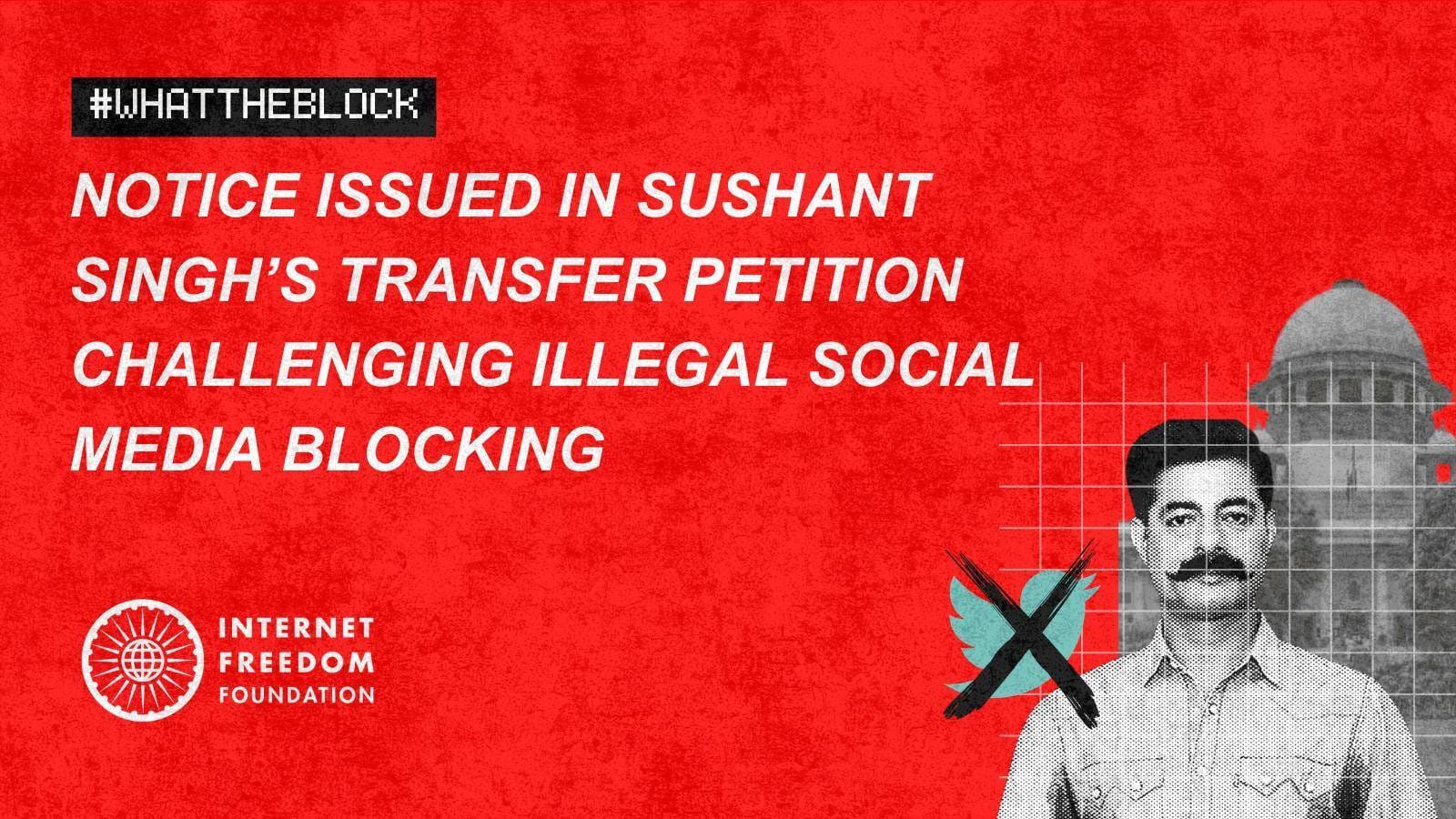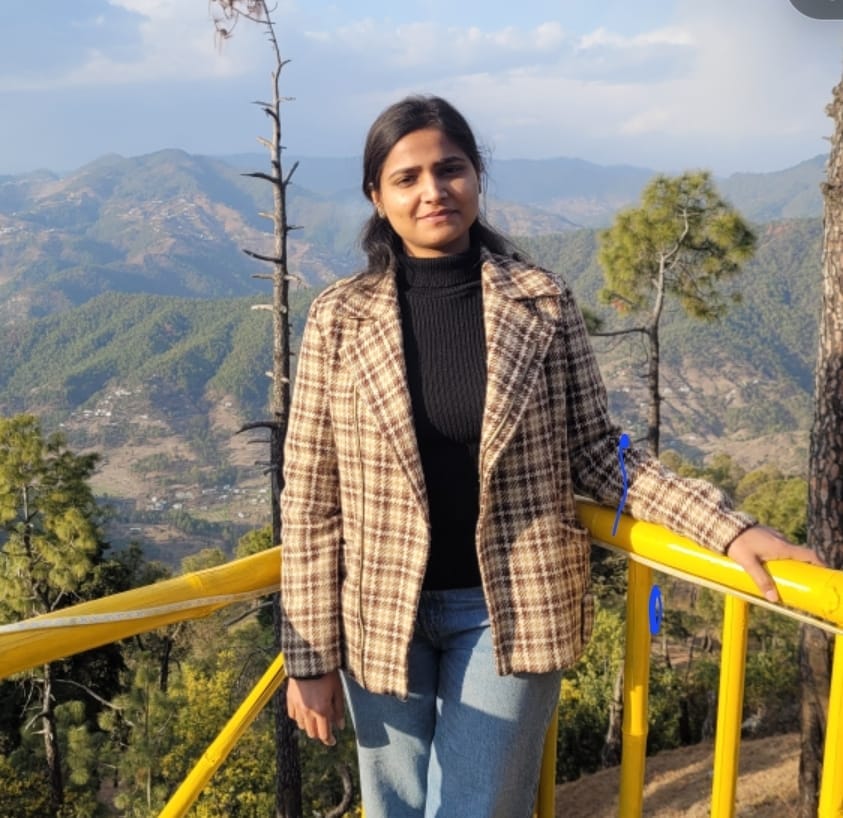
tl;dr
Sushant Singh, an actor and social activist with a verified account on ‘X’ (formerly Twitter) under the handle @sushant_says is seeking the transfer of his Writ Petition from the Bombay High Court to the Supreme Court, challenging Rule 8 and Rule 16 of the Information Technology (Procedure and Safeguards for Blocking for Access of Information by Public) Rules, 2009 (“the 2009 Blocking Rules”). The petition was listed before the Hon’ble Supreme Court on 02.05.2025, which issued notice and tagged it with the pending Writ petition filed by Software Freedom Law Center, India (“SFLC”), challenging the same rules.
Why should you care?
Sushant Singh, an actor and social activist, had his Twitter account (@sushant_says) suspended twice in 2021 without clear information on the reasons for the action. Despite multiple attempts to seek clarification through representations and RTI requests to the Ministry of Electronics and Information Technology (“MeitY”), he was denied access to the orders detailing the suspension, with MeitY citing Rule 16 of the 2009 Blocking Rules. This rule claims confidentiality, which hinders content creators from challenging such actions.
The denial of these orders is problematic because, without access to the suspension orders, individuals like Sushant cannot effectively challenge them in court or any relevant authority. He argues that content creators should have the right to see the blocking orders, as this transparency is essential for defending their rights. Moreover, individuals should be given a chance to be heard before such actions are taken—just as a person who writes a letter should be given the opportunity to correct it if needed, rather than the postmaster deciding to discard the letter without informing the sender of the reasons.
The failure to provide such essential information and the lack of an opportunity to defend one’s speech undermines free expression and due process. This lack of transparency led to Sushant filing the Writ Petition No. 1133 of 2022 before the Bombay High Court, challenging the refusal to provide these orders and seeking a legal remedy to ensure that content creators are not unfairly censored without recourse.
Background
Sushant Singh had filed a Writ Petition No. 1133 of 2022 before the Hon’ble Bombay High Court. In his Writ, he had challenged two orders passed by MeitY that denied his Right to Information requests. These requests sought information about the blocking of his Twitter account, including whether it was blocked due to a legal demand from Respondent No. 1, and a copy of the order that directed the block. These requests were rejected citing Rule 16 of the 2009 Blocking Rules, which mandates confidentiality. His petition had raised the issue of whether invoking Rule 16 to deny aggrieved persons access to blocking orders is unconstitutional, particularly when it involves their exercise of free speech.
In addition, Sushant Singh had also challenged Rule 8 of the 2009 Blocking Rules, which requires that aggrieved persons be given prior notice of a proposed blocking action and the opportunity to defend themselves.Sushant Singh argues that these provisions infringe on his rights and has reserved the right to challenge the overall validity of these rules if necessary.
The petition also questioned whether invoking Section 69A of the Information Technology Act to block access to information sought under the Right to Information Act is legally justified. The matter is currently pending before the Hon’ble Bombay High Court, and the pleadings in that petition have been completed.
Reason for filing the Transfer Petition
The Transfer Petition filed by Sushant Singh was prompted by the need to address overlapping legal questions regarding the constitutional validity of the Information Technology (Procedure and Safeguards for Blocking for Access of Information by Public) Rules, 2009, particularly Rule 16. Sushant’s petition, pending before the Bombay High Court (W.P. No. 1133 of 2022), challenged the refusal by the MeitY to provide him with the blocking orders related to his Twitter account suspension. This refusal raised the critical issue of whether Rule 16, which mandates confidentiality regarding such orders, is constitutional and whether it undermines the rights to freedom of speech and expression.
Simultaneously, a writ petition was filed by SFLC before the Hon’ble Supreme Court (W.P. (C) No. 161/2025) on February 10, 2025, challenging the same rules, particularly focusing on the unconstitutionality of Rule 16 and the need for procedural fairness in content takedown actions. The SFLC petition also sought the quashing of Rule 16 and the reading down of Rules 8 and 9 of the 2009 Blocking Rules, asserting that these provisions violate fundamental rights under Articles 14, 19, and 21 of the Constitution of India.
Both petitions raise similar questions of law regarding the constitutional validity of Rule 16, which concerns the denial of access to blocking orders issued regarding content creators’ speech. Both petitions also aim to safeguard constitutional rights, particularly the right to freedom of speech, and to ensure that content creators are afforded due process in content takedown actions. The petitions highlight the unconstitutional nature of the blocking procedures, particularly the opacity surrounding the issuance of blocking orders and the lack of notice, hearing, and transparency for those whose accounts are blocked.
Given the significant overlap in the subject matter and the prayers in both petitions—ensuring due process, transparency, and safeguarding the right to free speech—it was essential for the two petitions to be heard together. This would ensure a unified resolution, avoid conflicting judgments, and streamline the judicial process. Therefore, in the interest of justice, Sushant Singh filed a Transfer Petition requesting that his case be withdrawn from the Bombay High Court and transferred to the Supreme Court, where the SFLC petition was already pending. This move was made to prevent prolixity, multiplicity of proceedings, and to achieve a comprehensive resolution on the legality of the 2009 Blocking Rules.
Relief from the Court
On May 2, 2025, the Transfer Petition was listed before a division bench of Justices B.R. Gavai and Augustine George Masih of the Hon’ble Supreme Court. During the hearing, Sr. Adv. C.U. Singh argued for the admission and clubbing of the petition, emphasizing that a similar petition was already pending before the Supreme Court. Sr. Adv. Singh also requested a stay on the Bombay High Court proceedings to prevent the possibility of conflicting judgments, underscoring that the Supreme Court was already seized of the same issues in SFLC v. UOI (W.P. (C) No. 161/2025), a petition challenging Rule 16 and Rule 8 of the 2009 Blocking Rules. This would ensure a consistent legal approach.
After hearing Sr. Adv. Singh’s submissions, the Supreme Court Bench issued notice to the respondents and directed that the matter be tagged with the SFLC petition, which also addresses similar challenges to the Blocking Rules.
These petitions are crucial in upholding the fundamental right to freedom of speech and expression, a cornerstone of democracy. By challenging the constitutionality of Rule 16, and Rule 8 which mandate confidentiality regarding blocking orders, the petitions seek to ensure that content creators and individuals whose speech is censored have the right to know the reasons behind such actions.
This is vital for protecting the freedom to express dissent, share opinions, and engage in public discourse online without arbitrary censorship. Additionally, these petitions highlight the critical need for transparency in the content takedown process. If the government and intermediaries are allowed to block access to content without providing clear reasons or due process, it sets a dangerous precedent for unchecked and opaque censorship. The legal challenge aims to make sure that any restriction on speech is transparent, fair, and subject to judicial review, thereby strengthening the accountability of both governmental authorities and private platforms.
The Internet Freedom Foundation (IFF) is providing legal support to Sushant Singh in this matter. Sr. Adv. C.U. Singh was assisted by IFF’s legal team, which includes Advocates Apar Gupta, Vrinda Bhandari, Anandita Rana, Bidya Mohanty, Gayatri Malhotra, Naman Kumar, Injila Muslim Zaidi, and Shravani Nag Lanka. We will keep you informed of further developments on this, and we urge MeitY to comply with the law and operate its content takedown procedures with complete transparency. Online speech is a facet of our fundamental rights, and it cannot be censored with such reckless opacity.
Important Documents
- Copy of Sushant Singh’s RTI Application dated July 6, 2021 (link)
- Copy of MeitY’s reply dated July 27, 2021 to Mr. Singh’s RTI Application (link)
- Copy of First Appeal challenging MeitY’s reply (link)
- Copy of Sushant Singh vs. UOI & Ors. T.P (C) No. 1109 of 2025 (link)
- Copy of SFLC, India and Anr. vs.UOI and Anr., W.P.(C) No. 161/2025(Link)
- Copy of the Order dated 02.05.2025 passed by Hon'ble Supreme Court issuing the notice and tagging it with SFLC's petition (Link)

